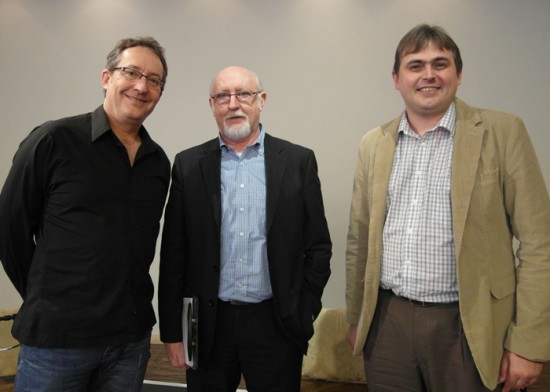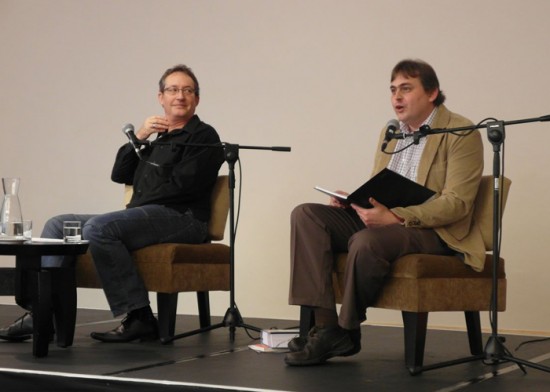EVENT: Dictionaries Uncovered (Saturday, 24 September; Townhouse Mostert)
SEAN O'TOOLE
 How words make it into a dictionary and others don’t as well as other interesting stories from the world of dictionaries. Rodney Trudgeon in conversation with Phillip Louw and Fred Pheiffer.
How words make it into a dictionary and others don’t as well as other interesting stories from the world of dictionaries. Rodney Trudgeon in conversation with Phillip Louw and Fred Pheiffer.
Last year the word “zef” gained traction in popular culture when musical ironists ‘Die Antwoord’ suddenly found a global audience for their mordant pop. Amongst the people following the band’s rise to fame was Phillip Louw, a lexicographer at Oxford University Press. He wasn’t so much interested in Die Antwoord’s vernacular rapping as the adjective used to describe it.
Was the word “zef” – its etymology said to be linked to the popularity of the Ford Zephyr among lower-income whites in the 1950s and ’60s, deserving of an entry in the Concise Oxford Dictionary? As with the word “ayoba”, a popular MTN marketing slogan, Louw was unsure. They both seemed too flash-in-the-pan. And so, allowing for the unpredictability of language as a dynamic, ever-evolving beast, he placed the words “zef” and “ayoba” on a watch list.
This is just one of the many anecdotes that enlivened this fascinating session about dictionary making and the business of finding words to describe words. While the particularities of singular words animate and make real the craft of dictionary making, dictionaries have to be understood in overview, which is where Fred Pheiffer, a colleague of Louw, chimed in.
The modern English dictionary, explained Pheiffer, is the product of a vast, intangible and proprietary electronic database. Referred to as the corpus – shorthand for the £35-million Oxford English Corpus – this “washing machine with words inside it”, as Pheiffer described it, is constantly fed with examples of authentic language usage. So, sentences from novels, poems, newspaper articles, Hansard transcripts, even transcripts of radio talk shows, find their way into this database of language in action.
Using software, lexicographers can and have determined some peculiar things when mining it. They can now confidently list the 100 key words in English. The top five words are, as one would expect, bland and functional: the; is; to; and; and of. As a reflection of global English, the corpus draws on usage from anywhere and everywhere. Unsurprisingly, however, the United States, with its vast publishing output, is the largest contributor to the corpus, accounting for half the authentic example sentences that underlie and validate the process of describing a word. Britain, which ranks second, only delivers about 26 percent, and South Africa a mere one percent.
Louw, who previously worked on the Woordeboek van die Afrikaanse Taal in Stellenbosch, offered an account of how new words enter the language. Neologisms, he said, such as Lewis Carroll’s coinage “chortle”, only constitute six percent of new words to English. Mostly, new words come about through a combination of existing words: “fanzines”, “websites” and “customisable” are examples. Modern electronic technology is not only refashioning the way lexicographers work, but also the very building blocks of language, said Louw, offering the examples of “text” and “sms” to illustrate how nouns have mutated into verbs.
“How do you decide what to leave out of a dictionary?” asked moderator Rodney Trudgeon, whose voice will be familiar to listeners of the decidedly un-zef Fine Music Radio. “It’s one of the hardest decisions I have to take,” responded Louw, who also offered an insight into his list of endangered words – watch out, “aerodrome”.
The decision on what to exclude is not as clear-cut as simply tracking the stamina of words like “zef” or “ayoba”. It also requires some nous for context. Take vulgar words: “They exist in the corpus,” smiled Louw. “We would put them in a concise dictionary, because we are showing a slice of language, but not in a dictionary pitched at school learners.”
This seemingly obvious and pragmatic solution points to a deeper, more problematic issue faced by lexicographers: description versus prescription. The tension between cultural values and the need for objectivity doesn’t only arise in the context of dictionaries aimed at schoolchildren. Pheiffer, who has worked on a bilingual English-isiZulu dictionary, explained how older, more conservative and rural Zulu language teachers balked at some of the contemporary descriptions contained in the new dictionary, even as the dictionary received plaudits from metropolitan speakers of the language in Johannesburg. “You cannot make a bilingual dictionary without mother tongue speakers,” he says. “Oxford employs a dedicated team of mother tongue speakers to ensure the authenticity of its descriptions.”
An impromptu prize-giving paid off for those who had paid attention, although a lady who shot up her hand in answer to a question about the origin of the word “chortle” almost had to eat humble pie, itself derived from “umbles”, or offal from hunts that was considered inferior food. Today we might simply say it was zef chow.

WORDSMITHS: From left, Fred Pheiffer, Rodney Trudgeon and Phillip Louw.

I'LL TAKE YOUR WORD: Fred Pheiffer (left) and Phillip Louw from Oxford University Press
 SLiPStellenbosch Literary Project
SLiPStellenbosch Literary Project
Thanks so much for fixing that up.
From the editorial team: Sincere apologies about that, we have fixed it up now.
Eish! So it’s the journo who gets to eat the humble pie. Sorry Philip, Fred.
Sorry, Phillip. Have changed the photos and will edit the article asap.
Uhm, I’m afraid you got us mixed up, in the photos and in your article. Phillip is the one on the right and Fred the one on the left.